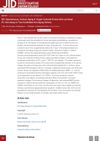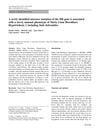 52 citations,
October 2012 in “Journal of Dermatological Science”
52 citations,
October 2012 in “Journal of Dermatological Science” The document concludes that mouse models are crucial for studying hair biology and that all mutant mice may have hair growth abnormalities that require detailed analysis to identify.
35 citations,
August 2006 in “Molecular genetics and metabolism” Tissue-specific variation in mutant load complicates genetic counseling and prenatal diagnosis.
[object Object]  11 citations,
January 2020 in “BMC pediatrics”
11 citations,
January 2020 in “BMC pediatrics” New mutations in the SLC39A4 gene found in twins help understand the genetic cause of acrodermatitis enteropathica.
April 2024 in “Molecules/Molecules online/Molecules annual” The composite sponge helps heal diabetic wounds by reducing inflammation and promoting new blood vessel growth.
 December 2023 in “JCEM case reports”
December 2023 in “JCEM case reports” A new gene variant causes glucocorticoid resistance in a mother and son.
 November 2023 in “Scientific Reports”
November 2023 in “Scientific Reports” A gene mutation in Lama3 is linked to a common type of hair loss.
 February 2020 in “Research Square (Research Square)”
February 2020 in “Research Square (Research Square)” Women with PCOS have worse physical health but similar mental health compared to those without PCOS.
April 2015 in “Dentistry 3000” Premature hair graying in the face may be influenced by genetics and environment.
 87 citations,
March 2014 in “Biochimica et Biophysica Acta (BBA) - Molecular and Cell Biology of Lipids”
87 citations,
March 2014 in “Biochimica et Biophysica Acta (BBA) - Molecular and Cell Biology of Lipids” Cholesterol sulfate buildup due to a genetic mutation disrupts the skin barrier, leading to the scaling skin seen in X-linked ichthyosis.
5 citations,
February 2022 in “Molecular genetics & genomic medicine” New gene variants linked to a rare inherited hair loss disorder were found in three Chinese families.
4 citations,
January 2017 in “Acta dermato-venereologica” A new EDA gene mutation was found in a Chinese family with a specific skin disorder.
 November 2022 in “Journal of Investigative Dermatology”
November 2022 in “Journal of Investigative Dermatology” The document concludes that a new method has been developed to test anti-aging substances on human skin, showing that these substances can reduce skin aging signs.
 October 2018 in “InTech eBooks”
October 2018 in “InTech eBooks” The gene Foxn1 is important for hair growth, and understanding it may lead to new alopecia treatments.
April 2019 in “Journal of the Endocrine Society” Sex hormones may be linked to inflammation in Hidradenitis Suppurativa.
January 2019 in “Figshare” Redheaded people have higher levels of vitamin D precursor, suggesting their hair color may be an adaptation to low sunlight areas.
 41 citations,
September 2017 in “Advanced Healthcare Materials”
41 citations,
September 2017 in “Advanced Healthcare Materials” A special hydrogel helps heal skin without scars and regrows hair.
 9 citations,
March 2022 in “Frontiers in Endocrinology”
9 citations,
March 2022 in “Frontiers in Endocrinology” About 19.4% of Iranian women in the study have Polycystic Ovary Syndrome, with the most common type involving irregular periods and high male hormone levels, but their heart and metabolic health is similar to women without the condition.
 2 citations,
September 2020 in “Schweizer Archiv für Tierheilkunde”
2 citations,
September 2020 in “Schweizer Archiv für Tierheilkunde” Swiss Holstein cattle with curly, short hair carry genes from the Simmental breed.
 6 citations,
May 2012 in “Archives of Dermatological Research”
6 citations,
May 2012 in “Archives of Dermatological Research” A new mutation in the HR gene is linked to a rare form of hair loss with limb deformities.
 August 2024 in “Veterinary Dermatology”
August 2024 in “Veterinary Dermatology” Topical ceramide treatment partially improves the skin condition in Jack Russell Terriers with a genetic skin disorder.
 3 citations,
July 2021 in “Life science alliance”
3 citations,
July 2021 in “Life science alliance” PNKP is essential for keeping adult mouse progenitor cells healthy and growing normally.
[object Object]  October 2023 in “Pediatric dermatology”
October 2023 in “Pediatric dermatology” Middle Eastern patients with epidermolysis bullosa show specific genetic mutations linked to different types of the disease.
 188 citations,
March 2018 in “Frontiers in Immunology”
188 citations,
March 2018 in “Frontiers in Immunology” Regulatory T-cells are important for healing and regenerating tissues in various organs by controlling immune responses and aiding stem cells.
 145 citations,
March 2010 in “Fertility and Sterility”
145 citations,
March 2010 in “Fertility and Sterility” Different types of polycystic ovary syndrome (PCOS) have varying severity, with Type I being the most severe and common.
 131 citations,
November 1998 in “The journal of investigative dermatology/Journal of investigative dermatology”
131 citations,
November 1998 in “The journal of investigative dermatology/Journal of investigative dermatology” Skin grafts on mice can cause an immune response leading to hair loss, useful for studying human hair loss conditions.
 73 citations,
April 2013 in “Stem cells”
73 citations,
April 2013 in “Stem cells” LGR5 helps maintain corneal cell characteristics and prevents unwanted changes by controlling specific cell signaling pathways.
 62 citations,
January 2010 in “Hormone research in paediatrics”
62 citations,
January 2010 in “Hormone research in paediatrics” Genetic screening is crucial for accurately diagnosing APS-1 due to its varied symptoms.
 53 citations,
September 2014 in “Reproductive Biology and Endocrinology”
53 citations,
September 2014 in “Reproductive Biology and Endocrinology” Different types of PCOS have different levels of metabolic problems, with the most severe type showing the highest disturbances.
 35 citations,
August 2010 in “The American journal of pathology”
35 citations,
August 2010 in “The American journal of pathology” Researchers created a new mouse model for studying Citrullinemia Type I and similar conditions, showing symptoms and treatment responses like those in humans.
 30 citations,
June 2012 in “Current Opinion in Endocrinology, Diabetes and Obesity”
30 citations,
June 2012 in “Current Opinion in Endocrinology, Diabetes and Obesity” Nonclassic congenital adrenal hyperplasia is a genetic disorder causing hormone imbalances, affecting fertility and requiring personalized treatment.






















